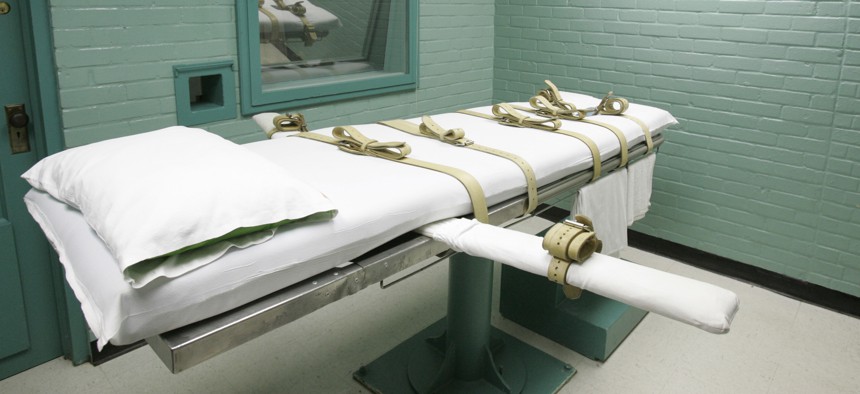Texas Can Keep Secret Execution Drug Supplier, Court Rules

A 2008 photo of the room where Texas condemned inmates are given a lethal dose of drugs. AP Photo
The Texas Supreme Court found that disclosing where the state has obtained the drugs "would create a substantial threat of physical harm" to the companies.
Texas can keep secret a supplier of the drugs used to execute prisoners through lethal injections, the state supreme court ruled Friday.
The judges found that “disclosing the source’s identity would create a substantial threat of physical harm to the source’s employees and others, and therefore need not be disclosed.”
Three lawyers who represent death row inmates in 2014 filed a lawsuit asking for the information over concerns about painful or protracted executions, as complaints have come up in other states. The Texas Department of Criminal Justice ended up providing the inmates with the execution protocol and the drugs used, but declined to provide the source of the drugs because of safety concerns.
A state district judge and an appellate court had ruled that the information should be turned over, finding no reason to believe the compounding pharmacy that makes the drugs would be vulnerable to physical harm.
The source of drugs used by states for lethal injections has become an issue in other states, as drug manufacturers have increasingly declined to provide the drugs directly. That means prison systems often have needed to rely on specialty pharmacies. Death row inmates have filed lawsuits to find out exactly what drugs states plan to use.
The lack of available drugs is one of the reasons executions have declined across the country in recent years, the Washington Post noted earlier this year after California Gov. Gavin Newsom issued a moratorium on executions in that state. That moratorium, like others that have been imposed in a few other states, was not related to how an execution would take place. Instead, Newsom, a Democrat, said he was concerned about the uneven way the death penalty is handed out by juries, as well as the possibility some people on death row could be innocent.
Louisiana Attorney General Jeff Landry, a Republican, criticized Newsom's action to the Post, saying it disregarded the relatives of murder victims who have already gone through years of appeals. “You’ve got to remember that behind every crime is a victim,” he said.
Like many states, California has not executed an inmate in years. But Texas for years has led the country in executions, as it did again last year, according to the Texas Tribune. Thirteen prisoners were executed in the state in 2018.
The Texas Legislature in 2015 passed a law to keep secret the state’s drug suppliers, along with guarding other information, such as the identity of the person who administers the drugs during executions. But that law doesn’t affect this lawsuit, which meant the lawyers could have found out the name of the 2014 supplier.
In the opinion by Justice Paul Green, the court emphasized that an Oklahoma pharmacy disclosed as providing execution drugs had received a threatening email from a professor alluding to the 1995 Oklahoma City bombing. Green wrote that appellate judges should have given more weight to “direct evidence and expert affidavits regarding significant risks of physical harm faced by lethal injection drug suppliers.”
Texas Attorney General Ken Paxton said the court made the right decision, adding that concealing the providers of the drugs will protect the companies and their employees. In a statement, Paxton noted that “the voters of Texas have expressed their judgment that the death penalty is necessary, and this decision preserves Texas’ ability to carry out executions mandated by state law.”
But one of the attorneys who sought the information, Maurie Levin, told the Texas Tribune that she was shocked by the ruling, noting that when a news report last year revealed a Houston pharmacy that had made the drugs there was only a peaceful protest held outside the business.
"The Texas Supreme Court’s opinion has no legal or factual integrity," Levin said.
Laura Maggi is the Managing Editor of Route Fifty and is based in Washington, D.C.
NEXT STORY: 'Phone Addicts' Are the New Drunk Drivers, Report Says






